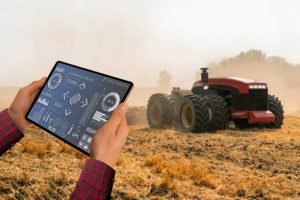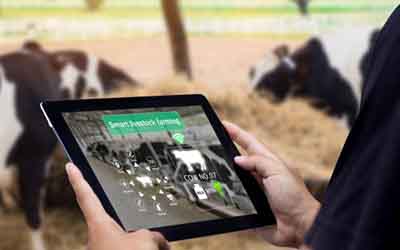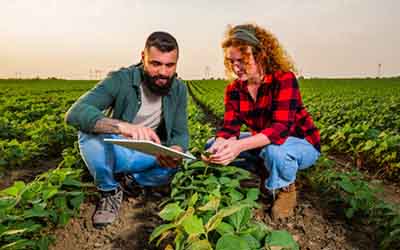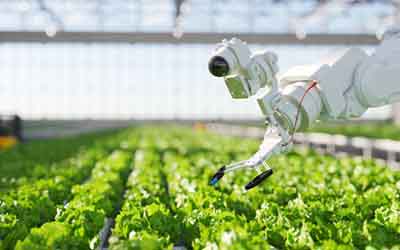In the rapidly evolving world of agriculture, the integration of technology has become not just an advantage, but a necessity.
The farming industry, with its myriad of challenges ranging from climate change to labor shortages, demands innovative solutions to stay ahead.
One such breakthrough that has significantly transformed the agricultural landscape is Farm Management Software (FMS).
This technology has emerged as a beacon of efficiency, guiding farmers towards more sustainable and profitable practices.
Farm Management Software is a game-changer in the truest sense, offering tools that streamline operations, enhance decision-making, and optimize resource management.
At its core, FMS is designed to be the farmer’s digital ally, simplifying complex processes and delivering actionable insights directly into their hands.
Whether it’s crop planning, livestock management, or financial tracking, FMS encompasses a wide array of functionalities tailored to meet the diverse needs of modern agriculture.
The adoption of Farm Management Software is not just about keeping up with technological trends; it’s about embracing a future where data-driven decisions lead to healthier crops, happier animals, and higher yields.

Overview of Farm Management Software
The agricultural sector has always been a cornerstone of human civilization, evolving with the times to meet the ever-changing needs of society.
Today, in an age dominated by technology, the introduction of Farm Management Software (FMS) represents a pivotal shift in how farming operations are conducted.
But what exactly is farm management software, and how has it evolved to become an indispensable tool for modern farmers?
Farm Management Software is a comprehensive digital solution designed to aid in the planning, monitoring, and analysis of farming activities.
It serves as an all-encompassing platform that integrates various aspects of farm management, including crop scheduling, livestock tracking, resource allocation, financial management, and much more.
By centralizing data and automating routine tasks, FMS enables farmers to make informed decisions quickly and efficiently.
The Evolution of Farm Management System
The journey of farm management software from rudimentary record-keeping tools to the sophisticated, integrated systems of today mirrors the broader trajectory of agricultural innovation.
Initially, FMS was primarily focused on digitizing the paper-based logs that farmers have used for centuries to track their operations.
However, as technology advanced, so did the capabilities of FMS. Modern systems are now capable of providing real-time data on weather conditions, crop health, market prices, and other critical factors affecting farm operations.
This evolution has been driven by the growing recognition of the complexities involved in farm management and the need for precision agriculture.
As farms have grown in size and complexity, the demand for a more holistic and data-driven approach to farm management has become increasingly apparent.
Key Components and Features of FMS
A robust Farm Management Software system is characterized by its ability to seamlessly integrate various functionalities into one platform. Some of the key components and features include:
- Crop Management
- Livestock Management
- Resource Allocation
- Financial Tracking
- Data Analytics
5 Top Farm Management Software
The Benefits of Implementing Farm Management Software
- Increased Operational Efficiency through Automation
- Enhanced Decision-making with Real-time Data and Analytics
- Improved Resource Management, Reducing Waste and Optimizing Inputs
- Financial Management and Tracking for Better Profitability Analysis
Increased Operational Efficiency through Automation
One of the most immediate benefits of FMS is the dramatic increase in operational efficiency it offers.
By automating routine tasks such as record-keeping, scheduling, and monitoring, farmers can free up valuable time and resources.
This automation extends across various domains of farm management, including irrigation systems, feeding mechanisms in livestock farming, and the application of fertilizers and pesticides in crop production.
Enhanced Decision-making with Real-time Data and Analytics
Farm management software provides farmers with access to real-time data and analytics, enabling them to make informed decisions quickly.
This data-driven approach to farming helps in identifying trends, forecasting outcomes, and mitigating risks.
For instance, by analyzing weather patterns and soil conditions, FMS can recommend the optimal planting and harvesting times, significantly impacting crop yields.
Improved Resource Management, Reducing Waste and Optimizing Inputs
Resource management is another area where FMS shines, offering tools to monitor and optimize the use of water, seeds, fertilizers, and other inputs.
By precisely tracking resource usage and identifying areas of waste, farmers can significantly reduce their operational costs.
Financial Management and Tracking for Better Profitability Analysis
The financial management capabilities of farm management software provide a clear picture of a farm’s financial health, enabling better budgeting, expense tracking, and profitability analysis.
Farmers can easily monitor their cash flow, manage invoices, and analyze the cost-effectiveness of different crops or livestock.
Choosing the Right Farm Management Software
In an era where technology significantly influences agricultural efficiency and productivity, selecting the appropriate Farm Management Software (FMS) is crucial for modern farmers.
The right FMS can transform the management of a farm, but with so many options available, making an informed choice requires careful consideration.
Factors to Consider Based on Farm Size, Type, and Specific Needs
- Farm Size: The scale of your operation significantly influences the type of FMS you need.
- Farm Type: Whether you’re managing crop production, livestock, or a mix of both, the nature of your farming operation will dictate the specific features you need.
- Specific Needs: Consider any unique aspects of your operation. Do you require advanced data analytics for predictive modeling? Is integration with existing hardware or software systems a must? Identifying these specific needs early on can significantly narrow down your options.
Tips for Evaluating and Selecting Software
- Trial Periods and Demos: Take advantage of trial periods to get a hands-on feel for how the software operates and whether it meets your needs.
- Scalability: Ensure the software can grow with your farm. Consider future expansions of your operation and whether the software can accommodate this growth.
- Integration Capabilities: The ability to integrate with existing systems (e.g., accounting software, hardware sensors) is critical for a seamless transition and operation.
- Security: With the increasing importance of data, choose software that offers robust security features to protect your information.
- Cost: Evaluate the pricing structure carefully. Consider not only the initial cost but also any ongoing fees for support, updates, or additional features.
Common Obstacles in Adopting New Technology in Agriculture
- Resistance to Change: One of the most significant barriers to implementing new technology is resistance from those who will be using it daily.
- Training and Skills Gap: The effectiveness of FMS heavily depends on the user’s ability to operate it. A skills gap among farm staff or the farm owner can hinder the successful adoption of the software.
- Integration with Existing Systems: Many farms already use some form of technology or system for various operations.
- Data Security Concerns: With the increasing reliance on digital tools, concerns about data security and privacy become more pronounced.
- Cost: The initial investment required for FMS and the ongoing costs for maintenance, updates, and support can be prohibitive for some farms.
Strategies for Effective Implementation and Training
- Engage and Involve Staff Early
- Tailored Training Programs
- Choose Software with Excellent Support and Integration Capabilities
- Prioritize Data Security
- Cost-Benefit Analysis
The Role of Customization and Scalability in Successful Integration
Customization and scalability are crucial for ensuring that FMS can meet the specific needs of a farm, both at the time of implementation and as it grows.
A system that can be tailored to the unique workflows and processes of a farm will be much more effective and readily adopted by users.

The Future of Farm Management Software
As the agricultural sector continues to evolve, so too does the technology that supports it.
Farm Management Software (FMS) is at the forefront of this evolution, offering innovative solutions that not only address current challenges but also anticipate future trends.
The future of FMS is shaped by advances in technology, shifts in global agricultural practices, and the growing emphasis on sustainability.
Emerging Trends and Technologies in Farm Management
- Artificial Intelligence (AI) and Machine Learning (ML)
AI and ML are increasingly being integrated into FMS to provide predictive analytics, automate decision-making processes, and enhance the accuracy of farm operations.
From predicting crop yields to diagnosing plant diseases early, AI-driven tools are set to revolutionize the way farms operate.
- Internet of Things (IoT) Integration
IoT devices, such as soil sensors, drones, and livestock wearables, are becoming more commonplace in agriculture.
These devices generate vast amounts of data that, when integrated with FMS, can offer real-time insights into farm conditions, leading to more informed management decisions.
- Precision Agriculture
Focused on optimizing field-level management regarding crops and farming practices, precision agriculture leverages technology to ensure crops and soil receive exactly what they need for optimal health and productivity.
FMS plays a crucial role in facilitating precision agriculture by processing and analyzing data from various sources.
- Blockchain for Traceability
Blockchain technology is being explored for its potential to enhance transparency and traceability in the agricultural supply chain.
By securely recording transactions, it can provide immutable records of the provenance of food products, a feature increasingly demanded by consumers.
My final thought Farm Management Software
Farm Management System (FMS) has proven its worth by increasing operational efficiency, enhancing decision-making through real-time data analytics, optimizing resource management, and improving financial tracking and analysis.
These benefits underscore the vital role of technology in not only meeting the current demands of the agricultural sector but also in anticipating and shaping future trends.
Choosing the right FMS requires careful consideration of a farm’s specific needs, size, and type, as well as the software’s user-friendliness, support services, and integration capabilities.
Recommendations
How to get a loan to start a cattle farm
6 Problems faced by farmers in getting loans
8 Difference between gardening and farming
5 Top Challenges faced by farmers in India
How to become a farmer with no experience



